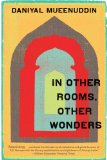Summary | Excerpt | Reading Guide | Reviews | Beyond the Book | Readalikes | Genres & Themes | Author Bio

Going out again into the dark chilly bedroom, Saleema found Rafik still kneeling at the hearth, the flames orange on his orange face.
“Is Bibi gone?”
“They announced lunch.”
“May I sit down?”
He moved over.
“It’s amazing. My village would fit in a corner of this garden, and we were thirty families. And it’s so clean and comfortable, out here in the middle of nowhere.”
“Harouni Sahib is a lord, and we’re poor people. And then, these are the games that the managers play. The better the house and gardens look, the more comfortable he is, the less Mian Sahib notices the tricks they all get up to on the farms. I don’t know what they’re storing it up for, stealing fertilizer and the water and cheating in the books. In the old days no one dared. Mian Sahib made these people—the fathers ate his salt, and now the sons have forgotten and are eating everything else.”
The fire cracked, the dry mango wood catching hungrily.
She threw a little twig into the fire. “At least their bellies are full.”
In the morning she washed Begum Kamila’s clothes, sitting by a faucet outside in the back garden, beside the unused tennis court. Foam on her arms, water splashing onto her bodice from the big orange bucket, she looked up at the trees blowing in the wind, the birds. She was alone. The swaybacked tennis net and the odd chalked lines made the lawn seem expectant, prepared. Last night she had taken a bowl of food quickly into her own room. She heard the men outside around a fire telling stories about the old tough managers and light-fingered servants, now dead, or about happenings on the farm, cattle thefts, dowries. Hassan and Rafik and even the drivers, who had after all been in service fifteen or twenty years, had old friends here.
Churning the clothes in the bucket, squeezing them out, she felt happier perhaps than she ever had been. The April sun had bite, even in the morning, reflecting off the whitewashed walls enclosing this back garden. The earth cooled the soles of her bare feet. Her thoughts ducked in and out of holes, like mice. I’ll avoid him, she thought, settling on this as a way forward, knowing that she would be seeing Rafik at lunch if not before. Her love affairs had been so plainly mercantile transactions that she hadn’t learned to be coquettish. But the little hopeful girl in her awoke now. Spreading the clothes to dry on a long hedge that bordered the tennis court, bright red and white and yellow patches against the healthy green, she sat there alone in the sun until lunchtime, undisturbed except once, by a gardener, who walked past with a can, stooping to water the potted plants arranged next to the building.
At lunch she made the chapattis—no one in the village could do that properly. Hassan came into the big hot kitchen, which had a row of coal-burning hearths set at waist level in one wall, and lifted the covers off the saucepans and casseroles prepared by the farm cook—enough for several dozen people.
“Hey, boy,” he said to the gangly farm cook, “I’ve never heard of chickens with six legs. I suppose you’re one of those guys—if you cooked a fly you’d keep the breast for yourself. At least you could waft it past your lord and master once.”
He pinched Saleema under her arm as she stood flattening the chapattis between her hands.
“Here’s where the real meat is.”
He laughed without mirth, a drawn-out wheeze.
The young cook didn’t know what to say. He hadn’t slipped anything away yet, though he certainly planned to.
Rafik stood beside another servant, who was spooning the food into serving dishes. The room had high ceilings, and a long wooden table in the middle. In the old times food for scores of people had been cooked here, when the master came on weeks-long hunting trips, with large parties and beaters and guides. Fans that had been broken for years hung down on long pipes, like in a railway station hall.
Excerpted from In Other Rooms, Other Wonders by Daniyal Mueenuddin. © 2009 by Daniyal Mueenuddin. Excerpted by permission of W.W.Norton & Company. All rights reserved. No part of this excerpt may be reproduced or reprinted without permission in writing from the publisher.
Your guide toexceptional books
BookBrowse seeks out and recommends the best in contemporary fiction and nonfiction—books that not only engage and entertain but also deepen our understanding of ourselves and the world around us.